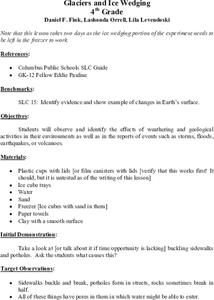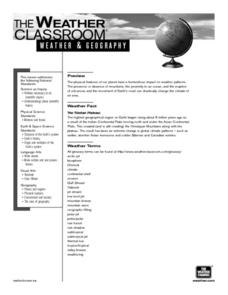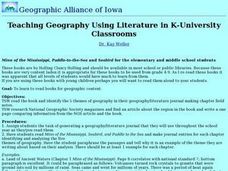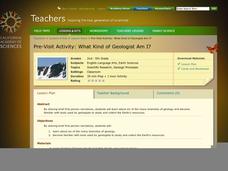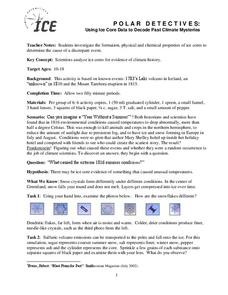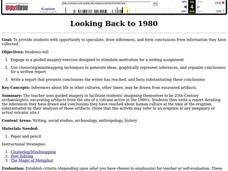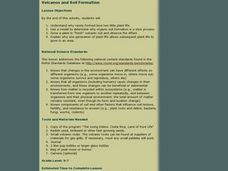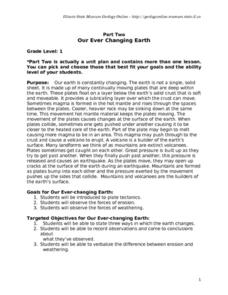Curated OER
Glaciers and Ice Wedging
Fourth graders observe and identify a variety of weathering and geological activities in the area in which they live. This focuses primarily on what happened during the Ice Age, and how, even today, glaciers are shaping and re-shaping...
Curated OER
The Tibetan Plateau
Learners discuss the characteristics of the biosphere, with a focus on the Tibetan Plateau. They participate in a question and answer period discussing biomes and climate patterns. They compare and contrast different ecosystems.
Curated OER
Endangered Species in the Sonoran Desert
Young scholars identify and explain some caused of endangerment and extinction for species as well as explain the effects of extinction on an ecosystem. Teachers use this lesson plan before teaching students about collecting insects or...
Curated OER
The Scientific Method, Blood Typing, and Antibiotic Resistance
Students are given some components of an experiment, where they are able to identify and fill in missing parts, such as hypothesis, conclusion, results, etc. They form a hypothesis given general scientific facts. Students apply the...
Curated OER
teaching Geography Using Literature in K-University Classrooms
Students read one of the following books: Minn of the Mississippi, Paddle-to-the-Sea, or Seabird, all by Holling C. Holling, and identify the five themes of geography as well as make a literature journal with chapter field notes. They...
Curated OER
Instruments From Around the World
How much does the environment affect how and what man creates? Children explore the effect of the environment on primitive man as they research raw materials from a specific location. They use their findings to write a short essay about...
Curated OER
Changing Energy: Landforms and Dance
Third graders choreograph a dance to represent the changes in nature. In this dance and nature lesson plan, 3rd graders use sharp quick movements to demonstrate changes.
Curated OER
Natural Disaster
Describe how plate tectonics account for various land formations. Learners discuss different marine sanctuaries and create a poster about tectonic activity in these areas. They share their posters with the class.
Southern Nevada Regional Professional Development Program
Pardon Me, Your Modifier is Dangling
Lost! (or misplaced) a modifier. Last seen dangling at the end of a sentence! Reward offered! To underscore the humor, class members are each given a sample sentence to illustrate (A woman passed by, leading a Springer Spaniel, in a...
California Academy of Science
Coincidental Colonization
The Galápagos Islands are an amazing place of isolated adaptation, colonized by an interesting mix of plants and animals. The class plays a game to help them understand how these organisms came to live on the island through a combination...
California Academy of Science
What Kind of Geologist Am I?
Transform your class into young geologists as they learn about six different branches of geology. Using the included geology career descriptions and picture cards, learners work in small groups deciding which tools and locations fit...
Space Race
Sensory Detectives
Test your learners' sensory awareness with three hands-on activities that ask pupils to use their other senses to identify and describe everyday objects hidden from sight.
Virginia Department of Education
Succession
The final lesson in a two-part series prompts scholars to create newspaper articles and succession events. Applying their knowledge of the ecosystem and the past examples of succession, they predict what will happen in the future...
Polar Trec
Polar Detectives: Using Ice Core Data to Decode Past Climate Mysteries
How does examining an ice core tell us about weather? Learners set up and explore fake ice cores made of sugar, salt, and ash to represent historical snowfall and volcanic eruptions. From their setups, scholars determine what caused the...
Nuffield Foundation
Microbes Ate My Homework
Now you have a new excuse not to do your homework. A long-term experiment has learners explore cellulose-digesting enzymes. They simulate how paper breaks down in a compost bin. There's no need to blame your dog for eating your homework...
Kenan Fellows
Making Connections with Water Quality
What's in your water? And, why is water quality so important? Enhance your class's level of water appreciation through a lesson that demonstrates the necessity of water quality. Environmental enthusiasts explore the EPA's Clean Water...
Curated OER
Incorporating 3D Visualizations into Your Classroom
Middle schoolers make observations through 3-D visualizations. They explore scientific and geologic processes through the use of 3-D pictures.
NOAA
Ocean Geologic Features
Sediment samples from the ocean bottoms tell scientists about climate change, pollution, and changes in erosion for the area. Groups of learners focus on sediments and their movement through water. During a hands-on activity, they...
NOAA
Exploring Potential Human Impacts
Arctic sea ice reflects 80 percent of sunlight, striking it back into space; with sea ice melting, the world's oceans become warmer, which furthers global warming. These activities explore how humans are impacting ecosystems around the...
Curated OER
Looking Back to 1980
Students use clustering/mind mapping techniques to generate ideas, graphically represent inferences, organize their conclusions and write a report that presents conclusions the writer has reached, and facts substantiating those conclusions.
Curated OER
School Site Ecosystem
Fourth graders are introduced to the concept of ecosystem; specifically, the interrelationships among plants and animals within an ecosystem, and their relationships to the environment in which they live and interact.
Curated OER
Why So Many Frogs?
Students explain the different stages in the growth of a frog, then analyze and collect data to make generalizations about a larger population. They determine the survival rate of a population of tadpoles under controlled conditions.
Curated OER
This Is Tanzania
Students study the volcanic history and the wildlife of Tanzania. They examine how most Tanzanians live on a subsistence agricultural economy.
Curated OER
Our Ever Changing Earth
First graders study ways in which the earth changes due to erosion and weathering in this series of lessons.
Other popular searches
- Types of Volcanoes
- Volcanoes and Earthquakes
- Shield Volcanoes
- Erupting Volcanoes
- Science Project Volcano
- Composite Volcanoes
- Internet Research Volcanoes
- Volcano Word Search
- Volcano Math Lesson
- Volcanoes Earthquakes
- Caribbean Volcanoes
- Dome Volcano
